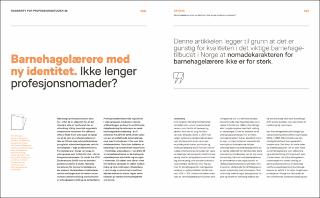Barnehagelærere med ny identitet - Ikke lenger profesjonsnomader?
Peer reviewed, Journal article
Published version
Permanent lenke
https://hdl.handle.net/11250/3115289Utgivelsesdato
2023Metadata
Vis full innførselSamlinger
Originalversjon
Tidsskrift for professionsstudier. 2023, 19 (36), 130-141. 10.7146/tfp.v19i36.140066Sammendrag
When professionals leave the profession for which they were trained, it is reasonable to assume that society has a challenge. Important theoretical and practical expertise and knowledge leave the sector. Often, escape routes from a profession are also a signal that those who are professionally educated are not satisfied with the working conditions at their workplace - a signal of an identity crisis in the profession. Pre-school or kindergarten teachers in Norway were for a long time a professional group that left their profession - they were nomads of professions. A study from 2015 (Gulbrandsen 2015) showed that kindergarten teachers stopped quitting. The nomad character for Norwegian pre-school teachers became weaker. Guldbrandsen concludes that the change can be explained by a strengthened societal recognition of the professional group's contribution and expertise. The professional identity gained legitimacy in the occupational group's surroundings. This article is based on findings from extensive follow-up research for the reform of Norwegian kindergarten teacher training - the BLU reform from 2014 to 2016. The survey provided extensive data material with answers from students for 3 years over the entire reform period. Our findings indicate that attitudes and values among the students - future professionals - can contribute to the nomadic character of the kindergarten teaching profession remaining low in the future as well. One factor that contributes strongly to explaining variation is the distinction between intrinsic and extrinsic motivation. The students in our selection are strongly internally motivated. The heart beats for the children. No other factor provides a stronger explanatory power than this one.
Beskrivelse
Først publisert i Tidsskrift i Professionsstudier, årg. 19, nr. 36 (2023)

